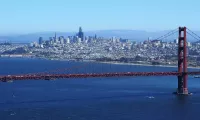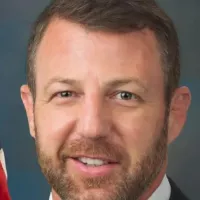California is a U.S. state on the Pacific Coast, bordering Oregon, Nevada, Arizona, and Baja California (Mexico). It's the most populous and third-largest state by area, with nearly 40 million residents and spanning 163,696 square miles. Its location along the Pacific and size contribute to its diverse geography and climate.
1900: Population Growth
From 1900 to 1965, California's population grew from under one million to the largest in the Union.
1906: San Francisco Earthquake
In 1906, the San Francisco earthquake was one of the deadliest disasters in U.S. history.
1909: Founding of KCBS (AM)
One of the oldest radio stations in the United States still in existence, KCBS (AM) in the San Francisco Bay Area, was founded in 1909.
1911: Outlaw of native American Use of Fire
In 1911, Native American use of fire in ecosystem management was outlawed, it has now been recognized.
July 10, 1913: Highest Temperature Recorded in Death Valley
On July 10, 1913, the highest temperature ever recorded in the world, 134 °F (56.7 °C), was recorded in Death Valley, California.
1913: Alien Land Act Passed
In 1913, California passed the Alien Land Act, which excluded Asian immigrants from owning land.
1928: St. Francis Dam Flood
In 1928, the St. Francis Dam flood occurred and it remains one of the deadliest disasters in U.S. history.
1936: Completion of the San Francisco-Oakland Bay Bridge
In 1936, the San Francisco-Oakland Bay Bridge was completed and transports about 280,000 vehicles per day.
January 20, 1937: Lowest Temperature Recorded in California
On January 20, 1937, the lowest temperature in California was recorded in Boca at -45 °F (-43 °C).
1937: Opening of the Golden Gate Bridge
In 1937, the Golden Gate Bridge opened and was the longest suspension bridge main span in the world at 4,200 feet (1,300 m).
1939: End of Exclusively Republican Governors in 1939
From 1899 until 1939, California had exclusively Republican governors. 1939 marks the end of this period.
1940: Opening of the Arroyo Seco Parkway
In 1940, the Arroyo Seco Parkway, connecting Los Angeles and Pasadena, opened as the first freeway in the Western United States.
1940: California's Population Demographics
In 1940, the Census Bureau reported California's population was 6% Hispanic, 2.4% Asian, and 90% non-Hispanic white.
1952: Republican-Leaning State from 1952
From 1952 through 1988, California was a Republican-leaning state.
1960: California Master Plan for Higher Education Adopted
In 1960, the California state government adopted the California Master Plan for Higher Education to develop an efficient system of public education.
1960: Winter Olympics at Squaw Valley
In 1960, the Winter Olympics were held at Squaw Valley Ski Resort (now Palisades Tahoe) in the Lake Tahoe region of California.
1964: Exception to Republican Electoral Votes in 1964
From 1952 through 1988, California was a Republican-leaning state, with 1964 as the sole exception in terms of electoral votes.
1964: Golden Gate Bridge span record
The Golden Gate Bridge held the record of being the longest suspension bridge main span since 1937 until 1964.
1965: California Population Reaches Highest in the Union
Between 1900 and 1965, California's population grew significantly, reaching the highest in the Union.
1970: Non-Hispanic Whites Decline
Between 1970 and 2011, the percentage of non-Hispanic whites in California's population declined from 80% to 40%.
1974: Farming-related Sales
In 1974, farming-related sales in California were $7.3 billion.
1976: Executions Since 1976
California has performed 13 executions since 1976.
1978: Proposition 13 Passed in 1978
In 1978, Proposition 13 was passed in California, limiting state property taxes and culminating in a tax revolt.
1980: California's Prison Population
In 1980, California's prison population was 25,000.
1986: California Proposition 63
In 1986, California Proposition 63 enshrined English as the only official language in California and ended Spanish as a language of instruction in public schools.
1988: Republican-Leaning State until 1988
California was a Republican-leaning state from 1952 until 1988.
1990: Percentage of naturalized immigrants
In 1990, 31% of immigrants were naturalized citizens.
1990: Democratic Candidates Elected Since 1990
Since 1990, California has generally elected Democratic candidates to federal, state and local offices.
1992: Democrats Win All of California's Electoral Votes Starting in 1992
Democrats have won all of California's electoral votes for the last eight elections, starting in 1992.
1992: Rodney King Riots
In 1992, tensions between police and African Americans, combined with unemployment and poverty in inner cities, led to riots, such as the Rodney King riots.
1994: FIFA World Cup Matches in California
Multiple games during the 1994 FIFA World Cup took place in California, with the Rose Bowl hosting eight matches (including the final), while Stanford Stadium hosted six matches.
1996: Authorization of California High-Speed Rail Authority
In 1996, the California High-Speed Rail Authority was authorized by the state legislature to plan a California High-Speed Rail system.
December 1997: Plant Species Listed as Threatened or Endangered
As of December 1997, 85 plant species in California were listed as threatened or endangered.
1998: State Spending
In 1998, State spending increased to $56 billion.
2000: Hispanic Population Growth
Between 2000 and 2011, the Hispanic population in California grew from 32% to 38%.
2000: Veterans of US Military Service
In 2000, California had 2,569,340 veterans of United States military service.
2001: California Energy Crisis
In 2001, California experienced an energy crisis leading to rolling blackouts, soaring power rates, and the importation of electricity. Southern California Edison and Pacific Gas and Electric Company faced criticism.
2002: Californians in the Military
As of 2002, Californians were relatively under-represented in the military as a proportion to its population.
April 2003: California Animals on the Federal Endangered List
As of April 2003, 118 California animals were on the federal endangered list, and 181 plants were listed as endangered or threatened.
April 2003: Bighorn Sheep Listed as Endangered
As of April 2003, the bighorn sheep was listed as endangered by the U.S. Fish and Wildlife Service.
2004: Proposition 71 Passed in 2004
In 2004, California voters passed Proposition 71 to fund stem cell research, making California the second state to legalize stem cell research.
2004: Farming-related Sales
In 2004, farming-related sales in California were nearly $31 billion.
2005: San Joaquin Valley Report
According to a 2005 report by the Congressional Research Service, the San Joaquin Valley was characterized as one of the most economically depressed regions in the United States.
2005: Rising Housing Prices
By 2005, housing prices in urban areas of California had significantly increased, with a modest home that cost $25,000 in the 1960s costing half a million dollars or more.
2005: Migrant Arrests at Mexican Border Reach High
In 2005, the number of migrants arrested attempting to cross the Mexican border in the Southwest reached a high of 1.1 million.
2005: School Enrollment
In the 2005-06 school year, California had over 6.2 million school students.
2006: Last Use of Death Penalty in 2006
California retains the death penalty, though it has not been used since 2006.
2006: Last Execution
California's last execution was in 2006.
2006: California Exports
In 2006, California exported $127 billion worth of goods.
2006: Jewish Population in California
The American Jewish Year Book placed the total Jewish population of California at about 1,194,190 in 2006.
2007: Indigenous Languages Survey
A survey conducted between 2007 and 2009 identified 23 different indigenous languages among California farmworkers.
2007: California Exports
In 2007, California exported $134 billion worth of goods.
2007: California's Prison Population
In 2007, California's prison population grew to over 170,000.
2007: Democratic Edge in California Delegation in 2007
In 2007, the Democrats held a 34–19 edge in the California delegation of the 110th United States Congress.
2007: Bursting of the Housing Bubble
In 2007, the housing bubble burst in California, causing prices to crash and leading to foreclosures and financial losses for institutions and investors.
November 2008: Approval of Proposition 1A
In November 2008, the California Proposition 1A, connecting all the major population centers in the state for a High-Speed Rail system, was approved by the voters at the general election.
2008: California Exports
In 2008, California exported $144 billion worth of goods. Vehicles, computers, and electronic products were the top exports, accounting for 42 percent of the state's exports. Over 50 car companies operate in California, such as Tesla and Mazda.
2008: Proposition 8 in 2008
In 2008, California voters passed Proposition 8, banning marriage for gay couples for the second time by vote.
2008: Revenue Generated by Farms and Ranches
In 2008, California's 81,500 farms and ranches generated $36.2 billion in products revenue.
2008: Religious Denominations in California
In 2008, the population identified their religion with the Catholic Church with 31 percent; Evangelical Protestants with 18 percent; and Mainline Protestants with 14 percent.
2009: Indigenous Languages Survey
A survey conducted between 2007 and 2009 identified 23 different indigenous languages among California farmworkers.
2009: U.S. Department of Defense Active Duty Servicemembers
In 2009, the U.S. Department of Defense had a total of 117,806 active duty servicemembers in California. Additionally, there were a total of 57,792 Reservists and Guardsman in California.
June 8, 2010: Proposition 14 Approval
After June 8, 2010, when Proposition 14 was approved, all candidates in the primary elections are listed on the ballot with their preferred party affiliation, but they are not the official nominee of that party.
September 2010: California Animals Listed as Endangered or Threatened
As of September 2010, 123 California animals were listed as either endangered or threatened on the federal list, along with 178 species of California plants.
2010: Largest Denominations by Adherents
According to the Association of Religion Data Archives (ARDA), in 2010, the largest denominations by adherents in California were the Catholic Church with 10,233,334, The Church of Jesus Christ of Latter-day Saints with 763,818, and the Southern Baptist Convention with 489,953.
2010: Veterans Living in California
As of 2010, there were 1,942,775 veterans living in California, of which 1,457,875 served during a period of armed conflict.
2010: Average Credit Score
In 2010, California residents were ranked first among the states with the best average credit score of 754.
2010: Military Recruits
In 2010, Los Angeles County was the largest origin of military recruits in the United States by county, with 1,437 individuals enlisting in the military.
2010: Proposition 14 Passed in 2010
In 2010, Proposition 14 was passed in California, completely changing the state's primary election process.
2010: California-born Residents Make Up Majority
Starting in the year 2010, for the first time since the California Gold Rush, California-born residents made up the majority of the state's population.
2010: Population Increase
The United States Census Bureau reported that the population of California was 39.54 million on April 1, 2020, a 6.13% increase since the 2010 census.
January 2011: California's Total Debt
In January 2011, California's total debt was at least $265 billion.
2011: Largest Minority Population
According to estimates from 2011, California has the largest minority population in the United States by numbers, making up 60% of the state population.
2011: California Agriculture Products
According to the USDA in 2011, the three largest California agricultural products by value were milk and cream, shelled almonds, and grapes. In 2011, California's 81,500 farms and ranches generated $43.5 billion in products revenue.
2011: Minority Population Under Age 1
As of 2011, 75.1% of California's population younger than age 1 were minorities, meaning they had at least one parent who was not non-Hispanic white.
2011: Start of Severe Drought
In 2011, California began experiencing a persistent drought, which would become the worst in its recorded history by 2017.
2011: Migrant Arrests Decrease
In 2011, the number of migrants arrested attempting to cross the Mexican border in the Southwest decreased to 367,000.
2011: California Immigration Statistics
In 2011, there were 277,304 immigrants to California, with 57% coming from Asian countries and 22% from Latin American countries.
2012: Democrats Gained Seats After 2012 Elections
After the 2012 elections, when the new system took effect, Democrats gained four seats and held a 38–15 majority in the delegation.
2012: Public School Employees per Student
For 2012, California's K–12 public schools ranked 48th in the number of employees per student, at 0.102 (the U.S. average was 0.137), while paying the 7th most per employee, $49,000 (the U.S. average was $39,000).
2012: Proposition 30 Passage
With the passage of Proposition 30 in 2012, California now levies a 13.3% maximum marginal income tax rate with ten tax brackets, ranging from 1% at the bottom tax bracket of $0 annual individual income to 13.3% for annual individual income over $1,000,000.
June 27, 2013: Balanced Budget Signed
On June 27, 2013, Governor Jerry Brown signed a balanced budget (no deficit) for the state, its first in decades; however, the state's debt remains at $132 billion.
2013: San Onofre Nuclear Plant Shutdown
In 2013, the San Onofre nuclear plant was shut down.
2014: Religious Denominations in California
In 2014, the largest religious denominations by number of adherents as a percentage of California's population were the Catholic Church with 28 percent, Evangelical Protestants with 20 percent, and Mainline Protestants with 10 percent.
2015: First Phase of Construction Begun
In 2015, the first phase of construction of the California High-Speed Rail system was begun.
2016: California Proposition 58
In 2016, California Proposition 58 reversed the prohibition on bilingual education.
2016: Per-Pupil Spending in California
In 2016, California's K–12 public school per-pupil spending was ranked 22nd in the nation ($11,500 per student vs. $11,800 for the U.S. average).
2016: California's Democratic Votes in 2016 Presidential Election
In the 2016 United States presidential election, California had the third highest percentage of Democratic votes behind the District of Columbia and Hawaii.
2016: Orange County Votes Democratic in 2016 Elections
Orange County had remained largely Republican until the 2016 elections, in which a majority of the county's votes were cast for Democratic candidates.
2016: Proposition 55 Passage
With the passage of Proposition 55 in 2016, California continued to levy a 13.3% maximum marginal income tax rate with ten tax brackets, ranging from 1% at the bottom tax bracket of $0 annual individual income to 13.3% for annual individual income over $1,000,000 (though the top brackets are only temporary until Proposition 55 expires at the end of 2030).
2017: Poverty Rate
As of 2017, using the official measure, California's poverty rate was 13.3%.
2017: Persistent Drought
By 2017, California's drought, which began in 2011, was considered the worst in its recorded history.
2017: Theories on the origin of "California"
In 2017, a state legislative document acknowledged that numerous theories exist regarding the origin and meaning of the name 'California,' but the only certainty is that a Spanish navigator added the name to a map by 1541.
2017: State Sales Tax Rate
In 2017, the minimum state sales tax rate reverted to 7.25% after the sales tax increase enacted by Proposition 30 was not extended by Proposition 55.
2018: Democrats Win 46 House Seats in 2018
Following the 2018 midterm House elections, Democrats won 46 out of 53 congressional house seats in California, leaving Republicans with seven.
2018: Deadliest Wildfire Season
In 2018, California experienced its deadliest and most destructive wildfire season.
2018: Busiest Airports
In 2018, Los Angeles International Airport (LAX) was the 4th busiest airport in the world, and San Francisco International Airport (SFO) was the 25th busiest airport in the world.
2018: California's Ethnic Composition
In 2018, the population of California was 60.7% non-Hispanic and 39.3% Hispanic or Latino. Non-Hispanic whites constituted 36.8% of the state's population.
2018: Orange County Votes Democratic in 2018 Elections
Orange County had remained largely Republican until the 2018 elections, in which a majority of the county's votes were cast for Democratic candidates.
2019: Millionaire Households
In 2019, there were 1,042,027 millionaire households in California, more than any other state in the nation.
2019: Postponement of Independence Referendum in 2019
The Yes California movement attempted to organize an independence referendum via ballot initiative for 2019, which was then postponed.
January 26, 2020: First Confirmed COVID-19 Case
On January 26, 2020, one of the first confirmed COVID-19 cases in the United States was identified in California.
March 4, 2020: State of Emergency Declared
On March 4, 2020, a state of emergency was declared in California due to COVID-19.
March 19, 2020: Statewide Stay-at-Home Order Issued
On March 19, 2020, a mandatory statewide stay-at-home order was issued in California to combat the spread of COVID-19.
April 1, 2020: California Population
On April 1, 2020, the United States Census Bureau reported that the population of California was 39.54 million, a 6.13% increase since the 2010 census.
July 2020: Population Decline Begins
In July 2020, California began to experience population declines that continued every year, due to moves out of state, declining birth rates, COVID-19 pandemic deaths, and less internal migration.
November 2020: Rejection of Affirmative Action in California in November 2020
In November 2020, California voters rejected affirmative action, marking the most recent instance of such a rejection in the state.
2020: California Apologizes for Japanese American Internment
In 2020, California issued an apology for the internment of Japanese Americans in concentration camps during World War II.
2020: California Life Expectancy
In 2020, California ranked fourth among states by life expectancy, with a life expectancy of 79.0 years.
2020: Fiscal Year 2020-2021
In fiscal year 2020–2021, the state judiciary's 2,000 judicial officers and 18,000 judicial branch employees processed approximately 4.4 million cases.
2020: California's Democratic Votes in 2020 Presidential Election
In the 2020 United States presidential election, California had the 6th highest percentage of Democratic votes behind the District of Columbia, Vermont, Massachusetts, Maryland, and Hawaii.
January 2021: Stay-at-Home Order Ends
In January 2021, the mandatory statewide stay-at-home order in California, which was issued on March 19, 2020, was ended.
September 2021: Total Non-Farm Employment
In September 2021, California recorded total, non-farm employment of 16,677,800 among 966,224 employer establishments.
2021: American Community Survey Language Data
According to the 2021 American Community Survey, 56.08% of California residents age 5 and older spoke only English at home, while 43.92% spoke another language at home.
2021: California Resident Move Out
Between 2021 and 2022, 818,000 California residents moved out of state, citing the high cost of living, housing shortage, rise of remote work, high taxes, and a difficult business environment.
2021: Driver's Licenses and Registered Vehicles
By the end of 2021, 30,610,058 people in California held a California Department of Motor Vehicles-issued driver's licenses or state identification card, and there were 36,229,205 registered vehicles.
2021: Per Capita GDP
In 2021, California's per capita GDP was $85,546, ranking fourth in the nation.
2021: Spanish Language in California
In 2021, Spanish was spoken by 28.18% of California's population.
2021: Fiscal Year 2020-2021
In fiscal year 2020–2021, the state judiciary's 2,000 judicial officers and 18,000 judicial branch employees processed approximately 4.4 million cases.
February 13, 2022: Super Bowl LVI at SoFi Stadium
On February 13, 2022, Super Bowl LVI was held at SoFi Stadium in Inglewood, California.
September 2022: California's Unemployment Rate
As of September 2022, California's unemployment rate was 3.9%.
October 2022: Voter Registration in October 2022
In October 2022, out of the 26,876,800 people eligible to vote, 21,940,274 people were registered to vote. Of the people registered, the three largest registered groups were Democrats (10,283,258), Republicans (5,232,094), and No Party Preference (4,943,696).
October 2022: Party registration
Party registration by county in October 2022.
2022: Ancestry Estimates from the American Community Survey
According to 2022 estimates from the American Community Survey, 32.4% of the population had Mexican ancestry, 6.6% had German ancestry, 6.1% had English ancestry, 5.6% had Irish ancestry, 4.9% had Chinese ancestry, 4.3% had Filipino ancestry, 4% had Central American ancestry (Mostly Salvadoran and Guatemalan), 3.4% had Italian ancestry, 2.8% listed themselves as American, and 2.5% had Indian ancestry.
2022: US Census Bureau Population Self-Identification
According to the United States Census Bureau in 2022, the population self-identified as (alone or in combination): 56.5% White (including Hispanic Whites), 33.7% non-Hispanic white, 18.1% Asian, 7.3% Black or African American, 3.2% Native American and Alaska Native, 0.9% Native Hawaiian or Pacific Islander, and 34.3% some other race. Also, 19% of Californians identified as two or more races in 2022.
2022: Progress in Indigenous Revitalization Efforts
As of 2022, cultural and language revitalization efforts among indigenous Californians have progressed among tribes. Also, in 2022, the largest dam removal and river restoration project in US history was announced for the Klamath River, benefiting California tribes.
2022: California Resident Move Out
Between 2021 and 2022, 818,000 California residents moved out of state, citing the high cost of living, housing shortage, rise of remote work, high taxes, and a difficult business environment.
2022: Homeless Population in California
In 2022, HUD's Annual Homeless Assessment Report estimated that there were 171,521 homeless people in California.
2022: Revival of Controlled Burns
In 2022, a new state program was created in collaboration with California's indigenous peoples to revive controlled burns as a means of reducing forest debris and improving wildfire resilience.
2022: California Recognizes Indigenous Land Management
In 2022, the California government recognized the benefits of controlled burning, a practice developed by indigenous peoples to mitigate destructive wildfires.
2022: Clean Energy, Jobs and Affordability Act
In 2022, the Clean Energy, Jobs and Affordability Act commits the state to running its operations on clean, renewable energy resources by 2035.
February 2023: State of Emergency Ends
In February 2023, Governor Gavin Newsom ended the state of emergency in California that had been in effect since March 4, 2020, due to COVID-19.
July 2023: Net Loss of Population
Between July 2020 and July 2023, California experienced a net loss of population of 433,000.
2023: Passenger Rail Master Plan
California's 2023 integrated passenger rail master plan includes a high speed rail system.
2023: Naturalized US Citizens in California
In 2023, more than half (55%) of California's immigrants were naturalized US citizens.
July 1, 2024: Mountain House Becomes Incorporated
On July 1, 2024, Mountain House became California's 483rd incorporated municipality.
2024: California's GSP
As of 2024, California's gross state product (GSP) is $4.172 trillion ($102,500 per capita), the largest of any U.S. state. As of 2024, California is home to 57 of the Fortune 500 companies, the highest number of any U.S. state.
2024: California's Economy in 2024
In 2024, California's gross state product was estimated to be $4.172 trillion as of Q4, making it the largest sub-national economy globally and the fourth-largest overall if it were an independent country.
2025: California's Nominal GDP
As of 2025, California's nominal GDP is larger than all but four countries.
2028: Los Angeles to Host Summer Olympics
Los Angeles will host the 2028 Summer Olympics, marking the fourth time that California will have hosted the Olympic Games.
2030: Planned Operation of First Segment
By the end of 2030, the first 171-mile (275 km) segment of the California High-Speed Rail system is planned to be put into operation.
2030: Proposition 55 Expiration
Proposition 55 is set to expire at the end of 2030, potentially altering the state's income tax structure.
2035: Renewable Energy Goal
By 2035, California aims to run its operations on clean, renewable energy resources as committed by the Clean Energy, Jobs and Affordability Act of 2022.
2050: Total Renewable Energy Conversion
By 2050, it would be possible to convert California's total energy supply to 100% renewable energy, including heating, cooling, and mobility.
2060: Projected Hispanic Population
It is projected that Hispanics will rise to 49% of California's population by 2060, primarily due to domestic births rather than immigration.
Mentioned in this timeline

Gavin Newsom is an American politician and businessman currently serving...

SoFi Stadium located in Inglewood California is a multi-purpose indoor...

The Super Bowl is the annual championship game of the...

San Francisco is the fourth-most populous city in California and...

The Catholic Church the largest Christian church globally with over...

Los Angeles is the most populous city in California and...
Trending
17 minutes ago Jeff Petry Traded to Minnesota Wild from Panthers Before Deadline

17 minutes ago Road Dogg departs WWE amid creative shakeup: End of an era.

18 minutes ago Kim English Out at Providence: A Coaching Change After a Horrendous Season

18 minutes ago Matt Eberflus Joins 49ers as Assistant Head Coach After Bears Stint.
18 minutes ago College Board Faces SAT Technical Issues, Kaskaskia Recognizes CTE Month

1 hour ago Federal Agents Remain in Minnesota After Border Czar Operation Ended: Key Takeaways
Popular

Ken Paxton is an American politician and lawyer serving as...

Hillary Diane Rodham Clinton is a prominent American politician lawyer...

Markwayne Mullin is an American politician and businessman serving as...

Jesse Jackson is an American civil rights activist politician and...

Jim Carrey is a Canadian-American actor and comedian celebrated for...

Bill Clinton served as the nd U S President from...